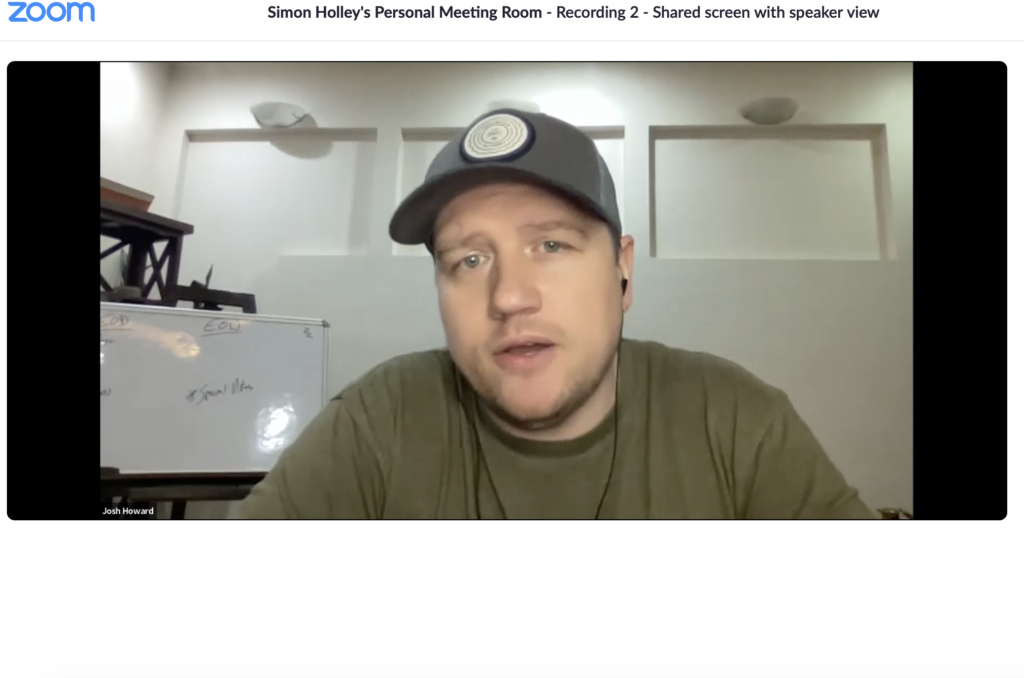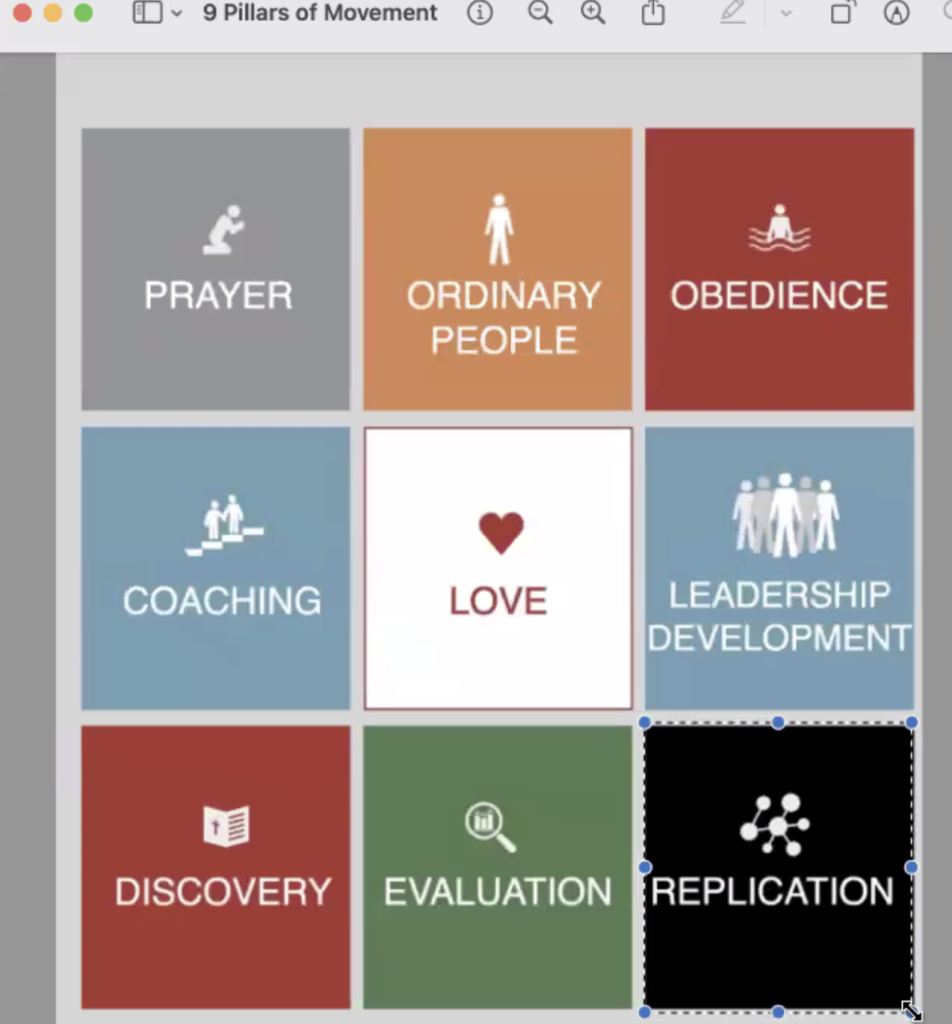I spent some time with my friend from NewThing Josh Howard as he helped a small group of us think about movements of disciple making and church planting.

Josh (who will be with us again at this year’s LAUNCH event in October) shared with us that in their work across South East Asia they radically changed their approach 8 years ago toward intentionally discipling people who would then go and make more disciples they call it “Train the saved, save the lost.”
And it’s simple but can be disheartening because it’s not all up and to the right – it’s usually more like a J curve, you see some subtraction – and you don’t see the big crowds now. It seems nothing much is happening because multiplication is slow at the start, one person reaching out and reproducing Jesus at a time. But when you get doubling disciples every six months or so look out – you start to see something amazing.
So in the First Quarter of 22 across the nations they are operating in, it’s starting to go exponential.
In January, February and March. 7,300 people were trained to go and make disciples.
The Gospel was shared person to person 60,000 times.
From that, over 13,000 people said Yes to following Jesus as a disciple leading to
2,100 new churches being birthed!
Josh told us he spent time recently with leaders from NEW GENERATIONS https://newgenerations.org (You may have heard of Roy Moran, who wrote the amazing book Spent Matches?) and in particular Harry Brownwho talked about:
NINE FOUNDATIONS OF DISCIPLE MAKING MOVEMENTS
What Josh talked about was super challenging and encouraging to me, so I want to share it so we as leaders can think and pray through this together.
Brown uses the analogy of a CAKE.
He said if you have 9 core ingredients of a cake that you’re making – even if you put seven of them in and put it in the oven – what you get out will not be the cake you hope to get. If you throw three things in a pan and put it in the oven – you’re not going to get a cake! All nine ingredients are massively important for the sake of movement, where you see them movements flourish. Every single one of them is a core and non negotiable ingredient of what it means to see movements of multiplication take place.
Now when we’re thinking about what we are doing and the culture that we’re creating do we have these ingredients in place – are they core ingredients involved in what we’re doing as church?
I bet all of us will have some of them to some extent, some of us may have most of them – but do we have all of them?
And if we don’t, then no wonder why we’re not seeing some of the fruit and multiplication that is happening by the Spirit of God in other parts of the world, if we don’t have the core ingredients we’re not getting cake!! The graphic Josh showed us looked like this

We looked at them in turn:
The Four Corners pull it together as ‘Cornerstones’ and the middle stones are next, then love touches all of them but let’s hit the corners first:
Remember these are the nine core ingredients of the movement ‘cake’ – and if you don’t have even one of these things you won’t get a full fledged movement out of it!
Number one is extraordinary PRAYER (and fasting)
Because we cannot do anything without complete dependence on the Lord. Every movement of God has to be out of a movement of prayer — and so we’ve got to make sure that infiltrates our entire our entire culture.
OBEDIENCE is next
This is this the necessary shift from a knowledge based system which is our traditional church structures, to an obedience based approach to discipleship. We are not to only be hearers of the word but doers of the word too! We all know the story of the wise and foolish builders.
The only difference according to Jesus between the wise man and the foolish man in Matthew 7 was that the wiseman – who built his house on the rock – heard the words of Jesus and immediately put them into practise! He did not just hear, he obeyed.
The church has been creating lots of people in the image of the foolish man who built his house on sand, he heard the words of Jesus and did nothing! that’s the only difference.
You know we’ve heard a lot of sermons about “If you build your life on sex, money, power or fame or any of that stuff it’s the sand” That’s completely true but it’s not what Jesus was saying that day.
What Jesus was saying is the sand is hearing God’s word and doing nothing with it.
That’s what t the foolish builder did – and so the way of obedience rather than knowledge is how the church can create wise builders intentionally.
Usually in our churches we are unintentionally creating foolish builders – just by our systems and processes.
How do we create an obedience based discipleship?
The third corner is DISCOVERY –
where people are learning to understand and live out the truths of scripture for themselves in every day life. Curriculums of (DBS) Discovery Bible Studies help people to discover and grow in God and it’s a core pillar of movements all across the world right now. Simple reproducible ways to study scripture and share it with other people is the way in order to get everyday people discovering and using their gifts and their talents in order to spread the gospel.
The fourth pillar here is REPLICATION – not just reproduction.
We hear a lot about reproduction but what we really need to aim at is replication – of Jesus in people’s lives. People becoming like Jesus. We want copies of Jesus’ DNA – that’s what this means.
To replicate is making an identical copy, not just reproducing stuff. When I reproduce my kids don’t look a little like me but not exactly like me – why? They have some of my DNA in them, but but they don’t look identical to me, they walk identical to me or sound like me but we want to replicate disciples of Jesus, who look exactly like Jesus, love like Jesus, talk like Jesus – as close to being exactly like him as we can in every way! Then multiply them all over the place!
So our aim is replicating Jesus in people, throughout churches and groups and cities and villages everywhere and the key with replication (or even reproduction) is it has to be simple. You can draw a triangle but not the Sistine Chapel.
Simple means it’s got to be something everybody can do – if my 12 year old son can’t do it it’s too complicated. If my 80 year old grandma can’t do it it’s too complicated.
it’s got to be simple and reproducible for replication of Jesus to occur.
The top middle pillar is ORDINARY PEOPLE.
This is the concept of reclaiming the priesthood of all believers. Movements are not led and multiplied by ‘great leaders’ – they are multiplied and replicated to reproduce through ordinary people who are out there making disciples, who make disciples.
They are starting small, house churches etc., because God loves to do extraordinary things through ordinary people. So we’ve got to flip the normal funnel right of like the big leaders doing all the work to movements where a lot of people are all doing a little bit of the work together.
This is like Jesus sending out the demoniac and the Samaritan women and Zacchaeus, the fishermen, the tax collectors, Mary Magdelene. Those are the types of people he comes looking for – those are the ones Jesus uses to multiply himself through themselves all across the all across the world.
EVALUATION
is basically tracking and evaluating what is working and what is not working and being honest about that. We must ensure that we’re tracking and celebrating the right things. Movements are evaluated differently than traditional things that churches track – in the west we usually track the 3 Bs: Buildings, Butts and Budgets.
But Disciple making movements must be tracked differently.
We’ve got to track them generationally –
We have to track gospel shares
We have to track things like not how many baptisms did you have, but how many baptisers do you have?
Not how many disciples do you have, but how many disciple makers do you have?
Those are all different questions that we must ask in order to see the generational growth of the movement.
And we must ruthlessly evaluate what is working and what is not – and how do we make sure that we are continuing to multiply things as far down generationally as we can and so we need to have new scorecards. We need to have a new definition of success
COACHING
is a big piece of this and the image they use here is great that to be a coach to someone you don’t need to be at the top of the staircase telling people what the next 10 steps are. To be a coach you just need to be one step ahead of the person behind you in an area – coaching other disciples and leaders you just need to be one or two steps ahead, guiding them and holding their hand through the process in order to get them going on the next step so we want to see in a movement that coaching is happening widely and by many at every level at every level – disciples coaching other disciples, microchurch leaders coaching others and so on.
Coaching is peer to peer learning together and it’s a key component of movements all across the world.
LEADERSHIP DEVELOPMENT
means we have various specific helps available, a cascading form of leadership development at every level to help everyone to make sure that leaders are multiplying other leaders not just ‘I am developing myself.’
LOVE
is in the middle – because love is what pulls it all together and touches everything. That all these things have to be centred on loving God and loving people. Every foundation stone is connected to love because without it we fall apart.
Without love ruthless evaluation becomes critical nasty. Coaching and development becomes performance. Obedience becomes legalistic and so on. Because we must remember the aim is always BE LIKE JESUS.
That’s what discipleship is and these nine areas provide a great checklist for us and perhaps it would be good to go through them and ask
‘Do we have all the ingredients?”
If we don’t, what’s missing and what will we do about it in the months ahead?
If we do, what needs strengthening?
Maybe pick ONE prayerfully and make it wildly important to move from where you are to where God wants you to go by the end of the year?
Discover more from Anthony Delaney
Subscribe to get the latest posts sent to your email.
